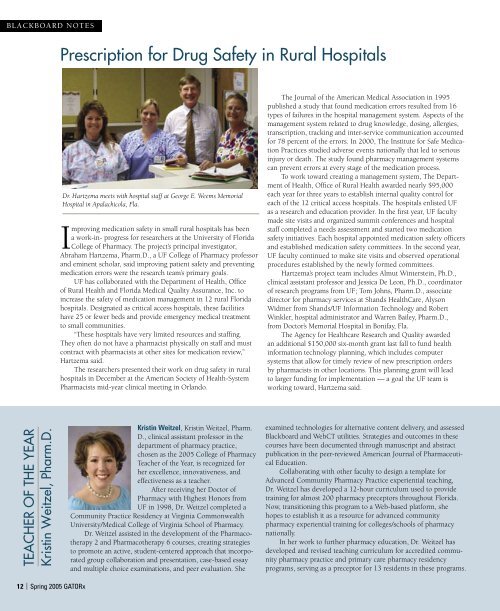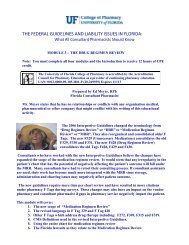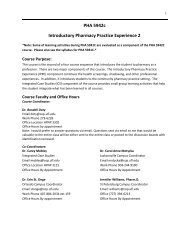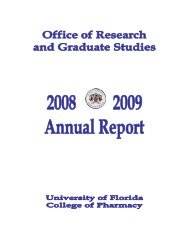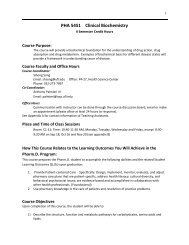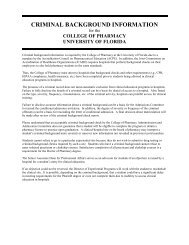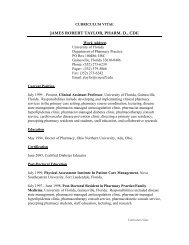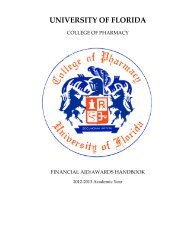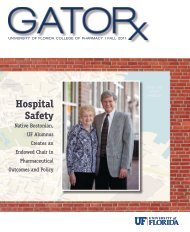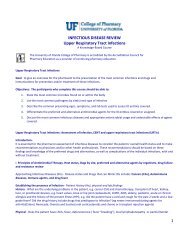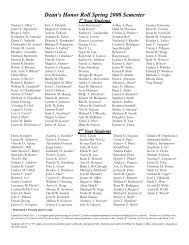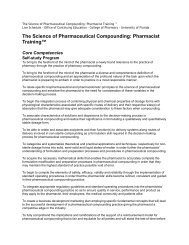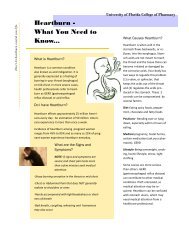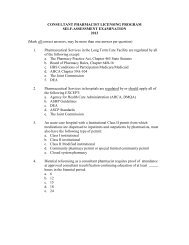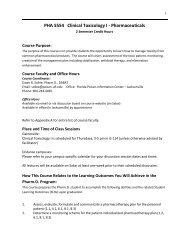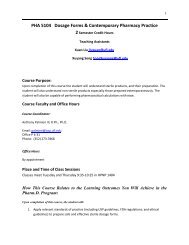GATORx W05.indd - College of Pharmacy - University of Florida
GATORx W05.indd - College of Pharmacy - University of Florida
GATORx W05.indd - College of Pharmacy - University of Florida
Create successful ePaper yourself
Turn your PDF publications into a flip-book with our unique Google optimized e-Paper software.
BLACKBOARD NOTES<br />
Kristin Weitzel, Pharm.D.<br />
TEACHER OF THE YEAR<br />
12 | Spring 2005 <strong>GATORx</strong><br />
Prescription for Drug Safety in Rural Hospitals<br />
Dr. Hartzema meets with hospital staff at George E. Weems Memorial<br />
Hospital in Apalachicola, Fla.<br />
Improving medication safety in small rural hospitals has been<br />
a work-in- progress for researchers at the <strong>University</strong> <strong>of</strong> <strong>Florida</strong><br />
<strong>College</strong> <strong>of</strong> <strong>Pharmacy</strong>. The project’s principal investigator,<br />
Abraham Hartzema, Pharm.D., a UF <strong>College</strong> <strong>of</strong> <strong>Pharmacy</strong> pr<strong>of</strong>essor<br />
and eminent scholar, said improving patient safety and preventing<br />
medication errors were the research team’s primary goals.<br />
UF has collaborated with the Department <strong>of</strong> Health, Office<br />
<strong>of</strong> Rural Health and <strong>Florida</strong> Medical Quality Assurance, Inc. to<br />
increase the safety <strong>of</strong> medication management in 12 rural <strong>Florida</strong><br />
hospitals. Designated as critical access hospitals, these facilities<br />
have 25 or fewer beds and provide emergency medical treatment<br />
to small communities.<br />
“These hospitals have very limited resources and staffing.<br />
They <strong>of</strong>ten do not have a pharmacist physically on staff and must<br />
contract with pharmacists at other sites for medication review,”<br />
Hartzema said.<br />
The researchers presented their work on drug safety in rural<br />
hospitals in December at the American Society <strong>of</strong> Health-System<br />
Pharmacists mid-year clinical meeting in Orlando.<br />
Kristin Weitzel, Kristin Weitzel, Pharm.<br />
D., clinical assistant pr<strong>of</strong>essor in the<br />
department <strong>of</strong> pharmacy practice,<br />
chosen as the 2005 <strong>College</strong> <strong>of</strong> <strong>Pharmacy</strong><br />
Teacher <strong>of</strong> the Year, is recognized for<br />
her excellence, innovativeness, and<br />
effectiveness as a teacher.<br />
After receiving her Doctor <strong>of</strong><br />
<strong>Pharmacy</strong> with Highest Honors from<br />
UF in 1998, Dr. Weitzel completed a<br />
Community Practice Residency at Virginia Commonwealth<br />
<strong>University</strong>/Medical <strong>College</strong> <strong>of</strong> Virginia School <strong>of</strong> <strong>Pharmacy</strong>.<br />
Dr. Weitzel assisted in the development <strong>of</strong> the Pharmacotherapy<br />
2 and Pharmacotherapy 6 courses, creating strategies<br />
to promote an active, student-centered approach that incorporated<br />
group collaboration and presentation, case-based essay<br />
and multiple choice examinations, and peer evaluation. She<br />
The Journal <strong>of</strong> the American Medical Association in 1995<br />
published a study that found medication errors resulted from 16<br />
types <strong>of</strong> failures in the hospital management system. Aspects <strong>of</strong> the<br />
management system related to drug knowledge, dosing, allergies,<br />
transcription, tracking and inter-service communication accounted<br />
for 78 percent <strong>of</strong> the errors. In 2000, The Institute for Safe Medication<br />
Practices studied adverse events nationally that led to serious<br />
injury or death. The study found pharmacy management systems<br />
can prevent errors at every stage <strong>of</strong> the medication process.<br />
To work toward creating a management system, The Department<br />
<strong>of</strong> Health, Office <strong>of</strong> Rural Health awarded nearly $95,000<br />
each year for three years to establish internal quality control for<br />
each <strong>of</strong> the 12 critical access hospitals. The hospitals enlisted UF<br />
as a research and education provider. In the first year, UF faculty<br />
made site visits and organized summit conferences and hospital<br />
staff completed a needs assessment and started two medication<br />
safety initiatives. Each hospital appointed medication safety <strong>of</strong>ficers<br />
and established medication safety committees. In the second year,<br />
UF faculty continued to make site visits and observed operational<br />
procedures established by the newly formed committees.<br />
Hartzema’s project team includes Almut Winterstein, Ph.D.,<br />
clinical assistant pr<strong>of</strong>essor and Jessica De Leon, Ph.D., coordinator<br />
<strong>of</strong> research programs from UF; Tom Johns, Pharm.D., associate<br />
director for pharmacy services at Shands HealthCare, Alyson<br />
Widmer from Shands/UF Information Technology and Robert<br />
Winkler, hospital administrator and Warren Bailey, Pharm.D.,<br />
from Doctor’s Memorial Hospital in Bonifay, Fla.<br />
The Agency for Healthcare Research and Quality awarded<br />
an additional $150,000 six-month grant last fall to fund health<br />
information technology planning, which includes computer<br />
systems that allow for timely review <strong>of</strong> new prescription orders<br />
by pharmacists in other locations. This planning grant will lead<br />
to larger funding for implementation — a goal the UF team is<br />
working toward, Hartzema said.<br />
examined technologies for alternative content delivery, and assessed<br />
Blackboard and WebCT utilities. Strategies and outcomes in these<br />
courses have been documented through manuscript and abstract<br />
publication in the peer-reviewed American Journal <strong>of</strong> Pharmaceutical<br />
Education.<br />
Collaborating with other faculty to design a template for<br />
Advanced Community <strong>Pharmacy</strong> Practice experiential teaching,<br />
Dr. Weitzel has developed a 12-hour curriculum used to provide<br />
training for almost 200 pharmacy preceptors throughout <strong>Florida</strong>.<br />
Now, transitioning this program to a Web-based platform, she<br />
hopes to establish it as a resource for advanced community<br />
pharmacy experiential training for colleges/schools <strong>of</strong> pharmacy<br />
nationally.<br />
In her work to further pharmacy education, Dr. Weitzel has<br />
developed and revised teaching curriculum for accredited community<br />
pharmacy practice and primary care pharmacy residency<br />
programs, serving as a preceptor for 13 residents in these programs.


